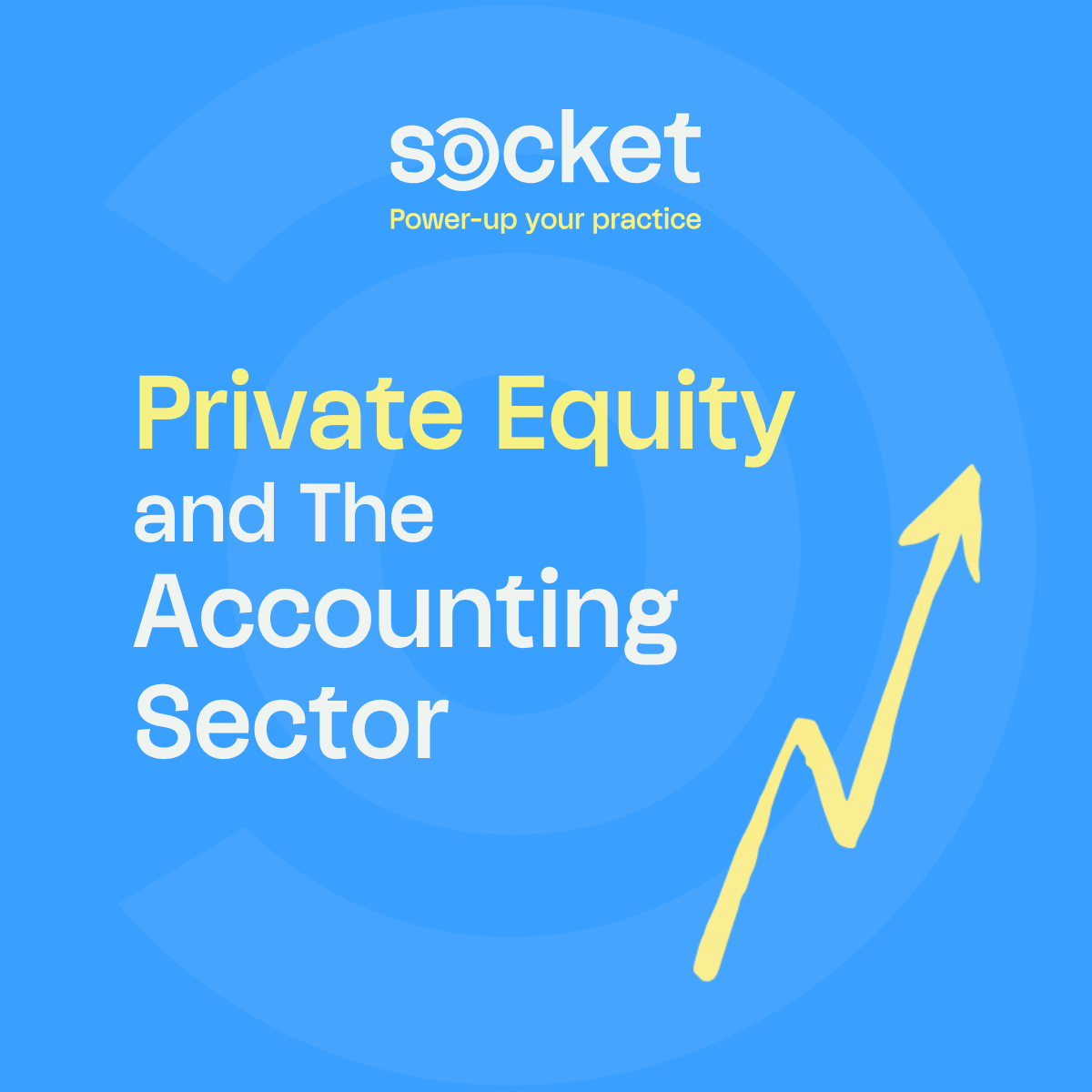Behind the scenes, private equity (PE) is transforming the UK’s accounting and bookkeeping sector, quickly, and at scale.
Private equity has taken the US by storm, with 10 of the top 30 largest firms in the US now with PE backing. Here in the UK, 24% of firms have either secured private equity already, or are looking to secure PE backing over the next three years, and, only 17% still see independence as a positive opportunity for their firm.
It’s safe to say that if you run, work in, or work with a mid-sized firm, it’s worth understanding what’s happening and why.
Private Equity Trends in the Accounting & Bookkeeping Sector
Private equity (PE) firms love the accounting sector for several strategic, financial, and operational reasons. From pricing changes and tech investment to consolidations and roll-ups, The PE playbook is now in full swing. For a lot of firm owners, the shift is already palpable, and for many others, it’s just beginning.
We’re seeing:
- Mid-tier firms are consolidating.
- Tech and AI is driving change.
- Firms are moving away from partner led models.
This movement is being driven by a number of factors, read on to hear the top reasons driving the deals in 2025.
What's Driving Private Equity Deals in the Accounting and Bookkeeping Sector
1. Predictable, Recurring Revenue
For decades, firms delivered compliance work in fixed annual cycles. Over the last 10 years, many have transitioned to monthly billing and expanded into services like bookkeeping, forecasting, and advisory. This change is reforming the industry, creating more predictable and recurring revenue streams.
And, that revenue reliability is gold dust to investors. It makes valuation models cleaner, and future cash flow easier to predict.
One of the first things PE firms tend to do after an acquisition? Raise prices. Not (just) because they want to squeeze margins, but often, it’s because prices haven’t been adjusted in years.
There’s latent value on the table, and PE is happy to unlock it.
2. Sticky Client Relationships
Clients rarely switch accountants.
In fact, many firms have multi-decade relationships with their client base, with some passed down through generations.
This “stickiness” reduces churn and acquisition costs, making the long-term profitability of an accounting firm feel unusually stable. From a PE perspective, that means less capital spent on sales and marketing, and more on growth and margin. A dream for PE firms focused on cash flow.
3. Huge Potential for Tech-Led Transformation
Most accounting firms are still working with outdated systems and processes. This might look like a patchwork of legacy tools, manual processes, and people-heavy workflows.
PE sees an opportunity here: inject capital, introduce automation and cloud-based platforms, and rebuild the tech stack to improve margins at scale.
We’ve seen this before in other sectors. Take banking for example: Santander became a case study in successful roll-up execution. How did it do it so well? By acquiring local banks and migrating them onto their single tech platform.
Others took a different approach, and, having worked at one of those banks myself, I still remember the pain long after the ink had dried on the deal.
Similar to the banking sector, accounting’s at an inflection point, and PE wants to lead the transformation.
4. Fragmented Market = Roll-Up Potential
There are over 40,000 accounting firms in the UK. Most of these are small practices that operate independently, and to private equity, this is a dream scenario.
Fragmentation = opportunity. The opportunity to build national or regional groups with significantly higher valuations than the sum of their parts.
PE firms acquire smaller firms, centralise operations, and rebrand where needed. It’s a classic roll-up play and it’s happening fast.
Take HG Capital’s investment in Azets (formerly Cogital), for example. The firm has grown rapidly across the UK and Europe through a relentless acquisition strategy.
In the US, TowerBrook invested in EisnerAmper, supporting a series of regional firm acquisitions to build scale and reach.
These aren’t one-off moves and we should expect more to come.
5. Strong Cash Flows and Low Capex
Most accounting firms generate steady cash with relatively low capex needs, making them ideal for leveraged buyouts (LBOs). This is one of the oldest tricks in the PE books, using debt to fund the purchase and repaying it using the company’s own cash flow. It works especially well in a sector like ours.
6. Cross Selling Potential
Many PE firms also own adjacent businesses (think legal services, wealth management, SME software, or insurance) giving them a distribution channel to cross-sell those services to a loyal client base. That added revenue upside makes the acquisition economics even more attractive.
7. The Growing Succession Gap
Thousands of firm owners in the UK are approaching retirement, with no clear successor in place.
For those owners, selling to PE provides a clean exit, and a way to realise value from decades of work. For PE, it’s a way to acquire solid businesses at reasonable valuations, often with the added bonus of acquiring experienced teams and loyal clients.
So... Why Are People Selling?
It’s not just the offer on the table…it’s the reality of running a firm today. Margins are tighter than ever, compliance work is being commoditised, and the pace of tech change can feel relentless.
For many firm owners, selling up is a way to convert years of stress and late nights into something tangible. It’s not about giving up, it’s about getting something back.
To private equity, accounting firms are defensible, cash-generative, and quietly powerful businesses, with the added bonus of a fragmented market ripe for consolidation. It's a mix of low risk, stable returns, and scalable upside.
The wave of investment isn’t just about numbers on a spreadsheet. It’s changing the shape of the sector itself, from the way firms price and package their services, to the platforms they use, and the succession paths they create. It’s truly an exciting time to be in our space.
What Does This Mean For You?
If private equity is this excited about the accounting sector, then you should be too. PE firms see real value in our industry…and that means there is real value in what you’ve already built.
Being independent doesn’t mean being left behind. In fact, it’s a powerful position to be in - if you’re informed, intentional, and ready to take action.
That’s where Socket comes in. We’re here to help you understand the shifts, make smart decisions, and turn this wave of change into an opportunity that works for your practice. This article is just the start. Over the coming weeks, we’ll unpack the PE playbook to help you build a firm that delivers the outcomes (and the lifestyle) you actually want.
Because if PE is betting big on this space, you can too.
Speak soon,
Jonathan & the Socket Team
Sources:
- CFO Brew (2024). Private equity now has a stake in 10 of the top 30 CPA firms. [online] 20 Nov. Available at: https://www.cfobrew.com/stories/2024/11/20/private-equity-now-has-a-stake-in-10-of-the-top-30-cpa-firms [Accessed 17 Jul. 2025].
- ICAEW (2024). ICAEW publishes research into the evolution of mid-tier firms. [online] Available at: https://www.icaew.com/about-icaew/news/2024-news-releases/icaew-publishes-research-into-the-evolution-of-mid-tier-firms-may-2024 [Accessed 17 Jul. 2025].
- NimbleFins (2023). How many accountants are there in the UK? [online] Available at: https://www.nimblefins.co.uk/business-insurance/accountant-insurance/number-accountants-uk [Accessed 17 Jul. 2025].
- HGCapital (2023). HG invests in Azets. [online] 19 Jun. Available at: https://www.hgcapitaltrust.com/news-insights/news/2023/19-06-2023 [Accessed 17 Jul. 2025].
- TowerBrook (2021). EisnerAmper announces investment by TowerBrook Capital Partners. [online] 16 Aug. Available at: https://www.towerbrook.com/eisneramper-announces-investment-by-towerbrook-capital-partners/ [Accessed 17 Jul. 2025].




